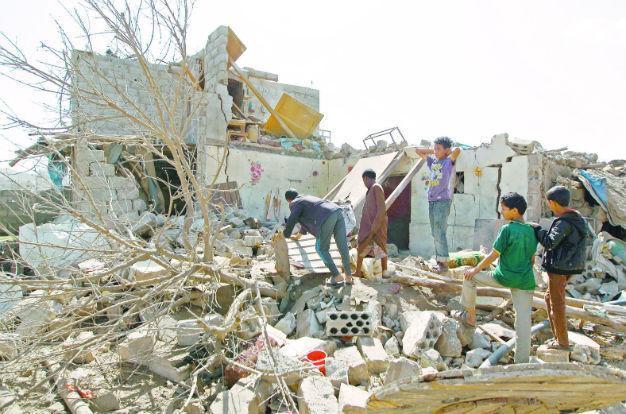Saudi-led coalition kills ‘twice as many’ Yemen civilians as all other forces: UN
GENEVA – Agence France-Presse

AFP photo
The United Nations on March 18 decried the “carnage” caused by recent air strikes by a Saudi-led coalition in Yemen, saying the alliance was responsible for the vast majority of civilian deaths in the conflict, while Washington welcomed talk of an end to the Saudi-led coalition’s major combat in the country.“Looking at the figures, it would seem that the coalition is responsible for twice as many civilian casualties as all other forces put together, virtually all as a result of air strikes,” U.N. human rights chief Zeid Ra’ad Al Hussein said in a statement, expressing outrage at one of the deadliest air strikes on a market this week.
Since the Saudi-led coalition began its air campaign in Yemen a year ago, the U.N. rights office said it had tallied just under 9,000 civilian casualties in the conflict, including 3,218 killed.
It condemned “the repeated failure of the coalition forces to take effective actions to prevent the recurrence of such incidents, and to publish transparent, independent investigations into those that have already occurred.”
Zeid decried that coalition air strikes “have hit markets, hospitals, clinics, schools, factories, wedding parties, and hundreds of private residences in villages, towns and cities.”
“Despite plenty of international demarches, these awful incidents continue to occur with unacceptable regularity,” he said, warning that “we are possibly looking at the commission of international crimes by members of the coalition.”
Zeid voiced particular alarm at two air strikes on a market this week in northern Yemen’s rebel-held Hajja province.
The United Nations on March 17 put the death toll from those strikes at 119, and Zeid’s office said Friday 106 of those killed in the crowded market were civilians, including 24 children.
“The carnage caused by two air strikes on the Al Khamees market ... was one of the deadliest incidents since the start of the conflict a year ago,” Zeid said.
U.N. Secretary General Ban Ki-moon demanded an investigation into the incident, one of the deadliest yet in the war.
Meanwhile, his staff on the ground “could find no evidence of any armed confrontation or significant military objects in the area at the time of the attack,” besides a small checkpoint 250 meters away, the statement said.
As tribal mediation brings calm to the Saudi-Yemen border after a nearly year-long campaign led by Riyadh against Yemeni rebels, Washington has welcomed talk of an end to the coalition’s major combat.
“We have expressed our concerns about the loss of innocent life in Yemen. The violence there that is plaguing that country has caught too many innocent civilians in the crossfire,” White House spokesman Josh Earnest said on March 17.
He said “we would welcome and do welcome” a statement from the coalition spokesman, Brigadier General Ahmed al-Assiri, who told AFP in an exclusive interview that the coalition is “in the end of the major combat phase.”
This would be followed by security stabilization and then reconstruction, Assiri said.
The coalition intervened on March 26 last year to support President Abedrabbo Mansour Hadi after rebels seized large parts of Yemen including the capital Sanaa.
Supported by coalition air strikes and some ground troops, anti-rebel forces have retaken territory, including much of the south.
But they have failed to dislodge the Shiite Houthi rebels from Sanaa or to completely remove them from the country’s third city Taez where intense battles continue.
Mustafa Alani, of the independent Gulf Research Centre, said that although fighting is not necessarily going to finish by March 26 “the operation is basically reaching its end.”
He said the coalition is keen “not to go beyond that psychological date.”
Rights groups have raised concerns about civilian casualties caused by the coalition as well as by the Houthis, who are allied with elite troops loyal to former president Ali Abdullah Saleh.
















